- Home
- Deborah Harkness
Time's Convert Page 41
Time's Convert Read online
Page 41
He kept going, though. He owed Vanderslice that.
When there was nothing more to take, and Vanderslice’s veins were dry and his heart on the verge of stopping, Marcus bit into his own wrist and held it up to Vanderslice’s mouth.
“Drink.” Marcus’s voice had the same note of calm concern that it did when he was seeing a patient, or working on a hospital ward. Trust me, was the unspoken message.
Vanderslice did. He latched on with teeth and tongue, instinctively thirsty for what would bring him back to life.
Marcus had to stop Vanderslice—his son, he reminded himself—before he passed out from loss of blood. He couldn’t take care of an infant if he were out cold. Gently, he drew away. Vanderslice snarled at him.
“You can have more,” Marcus told him. “Just let that settle for a moment.”
Vanderslice covered his ears. “Why are you shouting?” he whispered.
“I’m not. Your senses are sharper, that’s all,” Marcus explained.
“I’m thirsty,” Vanderslice complained.
“You will be. For weeks,” Marcus said. “Tired, too. But you won’t be able to sleep. I didn’t sleep for nearly two years after Matthew made me a vampire. Lie back and close your eyes. It’s best if you don’t try to do too much too fast.”
That was one of the things that Marcus learned when he and Matthew had run from Yorktown to Pennsylvania to New York to Massachusetts. He was glad he got to share his hard-won knowledge with someone, instead of being the one always asking questions from older, more experienced vampires. So far, Marcus liked being a father.
“While you rest, I’ll tell you about France. About your new family.” Marcus felt a bit delirious himself, after all the exertion. He closed his eyes, too, pleased that it had all gone so well.
* * *
—
“I TOLD YOU not to do it,” Gallowglass said, hauling Vanderslice out of the water.
“I had to. He deserved a second chance,” Marcus said. “It was my duty—”
“No. Saving the world is not your duty. I know that’s what Matthew tries to do, but it’s going to get us all killed one day.” Gallowglass shook the water off Vanderslice. “Your duty is to listen to Philippe and do precisely what he tells you and nothing more. You are supposed to be in Hertfordshire, counting sheep. Instead, you’re in Philadelphia making babies.”
“I’m not a baby,” Vanderslice snarled, snapping his teeth at Gallowglass.
“Have you ever seen a toothless vampire?” Gallowglass asked Vanderslice.
“No,” he replied.
“There’s a reason for that,” Gallowglass growled. “Try to bite me again and you’ll learn what it is.”
“Why is he so . . .” Marcus waved his hands in the air, unable to put Vanderslice’s behavior into words. Being an infant wasn’t easy, but Vanderslice was behaving like a lunatic, running after dogs in the street and stealing meat from the butchers in the market house. If he wasn’t more careful, he’d get himself killed or, even worse, arrested.
“Because you’re too young to be a father, Marcus. I told you as much,” Gallowglass said. “There are good reasons why Philippe forbade you from siring children.”
“What are they?” Marcus demanded.
“I can’t tell you.” Gallowglass dropped Vanderslice on the slimy cobblestones of Front Street. They were coated with bits of rotten fish, seaweed, and manure. “You need to ask Matthew.”
“Matthew isn’t here!” Marcus shouted, at the end of his tether.
“And you can thank your lucky stars for that, lad,” Gallowglass said. “Take my advice. Dry out young Claes and leave Philadelphia. He’s known here. You may be, too. Go to New York. That’s a city that will swallow you both up whole, and nobody will notice.”
“What do I do in New York?” Marcus said.
Gallowglass looked at him with pity.
“Whatever you fancy,” his cousin said. “And you better enjoy it, because it will be the last taste of independence you get after Matthew and Philippe find out what you’ve done.”
* * *
—
MARCUS AND VANDERSLICE ARRIVED in New York the following January. The two of them started out at the wharves and warehouses of the lower tip of Manhattan, scratching out a living helping unload and load ships. The waterfront felt familiar, like Philadelphia but on a smaller scale. What New York lacked in size it more than made up for in violence, however. Gangs of humans roamed the streets, and there was a thriving black market in contraband and stolen goods. Marcus and his son participated in this marginal economy, helping themselves to unattended cargo and reselling it. Slowly, they began to accumulate some money—and a reputation for outliving most of their competitors. Vanderslice earned the nickname “Lucky Claes” because of it, but most people just called him Lucky, just as most called Marcus “Doc.”
It was only a matter of time before Marcus grew tired of the thieving and the drinking that Claes enjoyed and instead devoted more time to his medical work. Like Philadelphia, New York had its fair share of yellow fever outbreaks, and Marcus found healing the sick was more satisfying than amassing a fortune. Between epidemics, Marcus tended to the problems of poverty among the city population and fought the constant scourges of typhus, cholera, and worms.
Vanderslice felt differently. He liked the pleasures that money brought. When Marcus encouraged him to pursue his own business interests, Vanderslice fell in with the wrong business partners, a pair of vampires newly arrived from Amsterdam with money to burn and no scruples. The Dutch vampires destroyed their rivals without a second thought or a pang of guilt, convinced that survival was the only evidence of valor. Vanderslice was soon spending more time with them than he was with Marcus, and the distance between them grew.
Marcus, who knew nothing about how to raise a child and even less about how to raise a man, failed to stem Vanderslice’s rush toward inevitable disaster. Marcus’s approach to fatherhood had none of Obadiah’s violence, or Philippe’s watchfulness, but was composed instead of Tom Buckland’s unquestioning support, Dr. Otto’s cheerfulness, and Matthew’s benign neglect. This gentle concoction gave Vanderslice enough freedom to indulge in serious mischief with drunken whores and endless high-stakes card games without having to face any serious consequences.
One March morning in 1797, just days after John Adams was inaugurated as president, Marcus found Vanderslice at the foot of the stairs that led to their rented rooms, his throat cut from ear to ear, lying in a pool of his own blood, a victim of a risky gamble or a business deal that turned sour. Marcus used his own blood to seal the wound and tried to force more of it down Vanderslice’s throat to revive him, but it was too late. His son—his family—was gone. No amount of vampire blood could bring back a lifeless corpse.
Marcus held Vanderslice and wept. It was the first time he had cried since he was a child, and what fell from his eyes this time was not salt water but blood. Gallowglass was proved right: Marcus did regret making Claes a vampire. Marcus erected a stone marker over Vanderslice’s grave and swore he would abide by his promise to Philippe. He would never make another child without his grandfather’s permission.
After Vanderslice’s death, Marcus devoted himself entirely to medicine, working in the hospitals at Belle Vue and on Second Avenue. The practice of medicine seemed to change daily, with inoculation giving way to vaccination and physicians abandoning bloodletting in favor of other treatments. Marcus’s Edinburgh education served him well, providing a solid foundation on which to build his skills. With a scalpel in one hand and his medical chest nearby, Marcus focused on his profession instead of his personal life.
Marcus was in New York, alone, when George Washington died in December 1799. A few weeks later, the century in which Marcus was born drew to a close. The events of the Revolutionary War were fading into memory for most Americans. Marcus wondered where Ver
onique was, and if Patience had had more children, and if his mother was still alive. He thought of Gallowglass, and wished his cousin were in New York to celebrate with him. Marcus wrote a letter to Lafayette, but did not know where to send it and so burned the paper in the fireplace so the wind might carry his good wishes to his absent friend. Marcus remembered his only child, Vanderslice, and felt regret for the ways he had failed him.
Revelers outside his house in the village of Greenwich, just on the outskirts of the city, welcomed the new century with enthusiastic shouts and dancing. Inside, Marcus poured himself a glass of wine, opened the worn covers of his copy of Common Sense, and remembered his youth.
The birthday of a new world is at hand. Marcus read the familiar words over and over, like a prayer, and hoped that Paine’s prognostication would be proven true.
31
The True Father
4 JULY
We didn’t usually celebrate Independence Day. But we had a Revolutionary War veteran in the house this year—two, actually, if one counted Matthew’s service. I asked Sarah what she thought we should do in honor of the occasion.
“Are you sure Marcus would want to remember the war, and everything that came before and after?” Sarah looked doubtful. “He can’t even eat flag cake. What’s the point?”
The Bishop contribution to every Madison bake sale had been a vanilla sheet cake, with white frosting and rows of strawberries for stripes and blueberries for the blue field of stars.
“He’s had a difficult few days, it’s true,” I said. Marcus’s account of Philadelphia and what had happened there was on everyone’s mind. No matter where our conversations started this summer, they always seemed to end with a tale of rebirth and the complications that followed.
Phoebe seemed both with us all the time and very far away as a result. I couldn’t imagine how difficult the strange push and pull between past, present, and future felt to Marcus.
In the end, Marcus took Independence Day on himself.
“I’ve been thinking,” Marcus said on the morning of the Fourth of July, “what about you and me put on a fireworks display tonight?”
“Oh, I don’t know . . .” I couldn’t imagine how Hector and Fallon would react to all that banging and booming—never mind Apollo and the twins.
“Come on, it will be fun. The weather is perfect,” he insisted.
This was the Marcus I remembered from Oxford—irrepressible, energetic, and full of charm and enthusiasm. With every shared memory, and as each passing day brought him closer to his August reunion with Phoebe, a little more of his hope and optimism returned. Marcus was less tangled in the strands of time that surrounded him. There were still red strands in a snarl of pain and regret, but there were hints of green for balance and healing, as well as twists of black and white for courage and optimism, along with Marcus’s signature, sincere blue.
“What do you have in mind?” I asked with a laugh.
“Something with lots of color. It has to sparkle, of course, or Becca won’t like it,” Marcus said with a grin. “We can use the moat’s reflections to make it seem like there are fireworks on the ground as well as in the sky.”
“This is beginning to sound like a fireworks display at Versailles,” I said. “I’m surprised you don’t want illuminated fountains and arcs of water, accompanied by something by Handel.”
“I’m up for that if you are.” Marcus surveyed me over his coffee cup, a twinkle in his eye. “Though to be honest, I’ve never been much for all the trappings of monarchy—which definitely includes Handel.”
“Oh, no.” I warded him off with my hands. “If we are going to do fireworks, they’re going to be normal, everyday fireworks—the kind that you buy in a stand at the side of the road. No magic. No witchcraft.”
“Why?” Marcus asked.
We stood in silence for a moment. Marcus’s blue eyes held a definite note of challenge.
“I don’t see the point of doing something ordinary, when it could be extraordinary,” he said. “I know it’s been a crazy, fucked-up kind of summer. You weren’t expecting to have me here the whole time, for a start. Nor did you think you’d have to relive the events of my past with me.”
“But that’s been the best part of it,” I interrupted. “Far better than getting my grades in, or dealing with the Congregation, or even my research.”
“I’m glad that my constant presence pales in comparison with Gerbert and Domenico,” Marcus teased. “Still, we could all use a little bit of leavening in the lump. The summer hasn’t exactly been a vacation thus far.”
“What an expression!” I laughed. “Where did you learn that? It sounds like something Em would have said.”
“The Bible.” Marcus picked a blackberry out of the big bowl Marthe had left on the counter and popped it in his mouth. “You’re not very well versed in your proverbs and parables, Professor Bishop.”
“Guilty of being a pagan, your honor,” I said, raising my hand high. “But I bet you don’t know the names of all the sabbats witches observe and their dates, either.”
“True.” Marcus held out his hand. “So, do we have a deal?”
“I don’t even know what I’m agreeing to,” I said, reaching for it.
Marcus withdrew his hand slightly. “Once we shake, there’s no backing out of it. A deal’s a deal.”
“Deal.” I shook Marcus’s hand.
“Don’t worry,” he said. “What could possibly go wrong?”
* * *
—
“GOOD LORD.” Matthew stood, mouth open, and surveyed our work with amazement.
Marcus was hanging from a tree branch like a possum, a string of lights in his teeth. I was drenched and sunburned, and one of my eyebrows was a trifle singed. Bales of hay studded the field on the far side of the moat. We’d rowed two of the wide-bottom boats around from the boathouse and tied them to the shallow dock that Marcus and Matthew used for fishing. I’d decorated the boats with garlands of red and white flowers to make them look more festive.
I threw my arms around Matthew and gave him a kiss. “Amazing, isn’t it?”
“I had no idea we were in for such an extravagant production,” Matthew said, grinning down at me. “A few sparklers, maybe, but this?”
“Wait until you see the fireworks,” I told him. “Marcus went to Limoges, and bought all the leftovers from the Fêtes des Ponts in June.”
“We’ve got something special planned for afterward,” Marcus said, draping the lights over the end of the branch. He dropped his legs, swung for a moment by one hand like a monkey, and then plummeted thirty feet straight down.
“And when is this all starting?” Matthew asked.
“Ten thirty—sharp,” Marcus said. “Are the twins taking naps?”
“I left them—and Apollo—sleeping soundly,” Matthew said.
“Good, because I don’t want them to miss this.” Marcus gave me a salute and went off smiling. As he walked, his smile turned to whistles.
“I haven’t seen him like this for months,” Matthew said.
“Me, neither.”
“We’re just passing the halfway point in his separation from Phoebe,” Matthew said. “Maybe realizing that so much time has already gone by accounts for his change of mood?”
“Possibly. Telling his tale has helped, too.” I looked up at Matthew. “Do you think he’ll be ready to talk about New Orleans soon?”
A shadow crossed Matthew’s face. He shrugged.
“Speaking of time,” Matthew said, deliberately changing the subject. “Have you heard from Baldwin? His two-week deadline came and went without a word.”
“No, I haven’t talked to him.” I didn’t even have to cross my fingers. It was the absolute truth.
That didn’t mean Baldwin hadn’t left me a dozen messages, in both my voicemail and my e-mail. He’d
also written me a letter, which bore a Japanese postmark. I’d dropped it in the moat without reading it, comforted by the fact that he was halfway around the world.
“Odd. It’s not like Baldwin to let something like that slip,” Matthew mused.
“Maybe he changed his mind.” I took Matthew’s hand in mine. “I’m going to weave a spell around Apollo. Want to come and watch?”
Matthew laughed.
“Wait, I have an even better idea. You’ll have to catch me if you want to find out what it is.” I crooked my finger at him. Then I took off at a run.
“That is the best invitation I’ve had in some time,” he said, strolling after me.
I kept running, knowing this was just part of the chase, knowing Matthew would catch me, still surprised when he tackled me to the ground, his arms cradling me from impact, a few yards from our secret hideaway.
At some point in the late nineteenth century, Philippe had constructed a small boathouse inside a curve of the moat that looked over the estate’s open fields and forests. The structure was typical of its time, made out of wood rather than the castle’s stone, and decorated with all manner of gingerbread trim.
It had fallen into a state of romantic ruin, the original yellow paint on the outside faded and peeling, and the inside dusty with disuse. Matthew had fixed the roof to make it weathertight again, and had big plans to restore it to its former glory. Now that he’d widened and deepened the moat, and stocked it with fish, these plans no longer seemed as ridiculous as they once had. I could imagine us all enjoying a paddle around on the moat as the children got older—though the moat was never going to provide me with enough room to ply the oars on a racing scull.
Matthew and I often fled to the boathouse when we needed some privacy. There was a sturdy, welcoming chaise longue inside, which we had grown fond of during our stolen moments away from the twins. This summer, with all that was going on with Marcus, not to mention Agatha and Sarah visiting, we hadn’t spent as much time here as we had hoped.

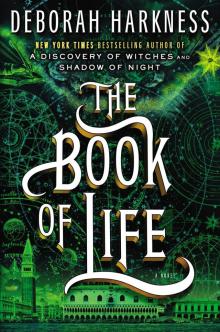 The Book of Life
The Book of Life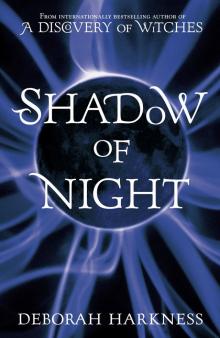 Shadow of Night
Shadow of Night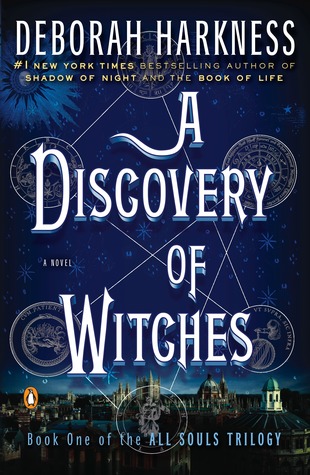 A Discovery of Witches
A Discovery of Witches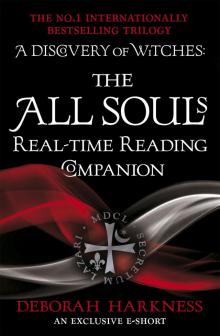 The All Souls Real-Time Reading Companion
The All Souls Real-Time Reading Companion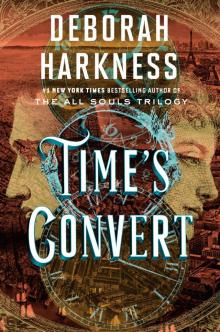 Time's Convert
Time's Convert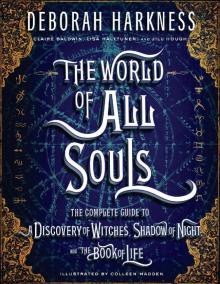 The World of All Souls
The World of All Souls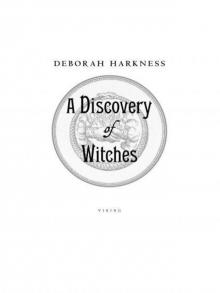 A Discovery of Witches: A Novel (All Souls Trilogy)
A Discovery of Witches: A Novel (All Souls Trilogy)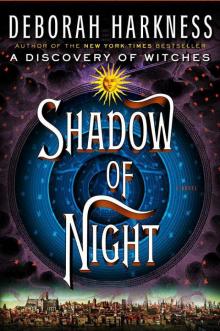 Shadow of Night: A Novel
Shadow of Night: A Novel